The Man Who Beat the Highway Lobby
Milwaukee’s Dennis Grzezinski may be America’s most successful environmental attorney.
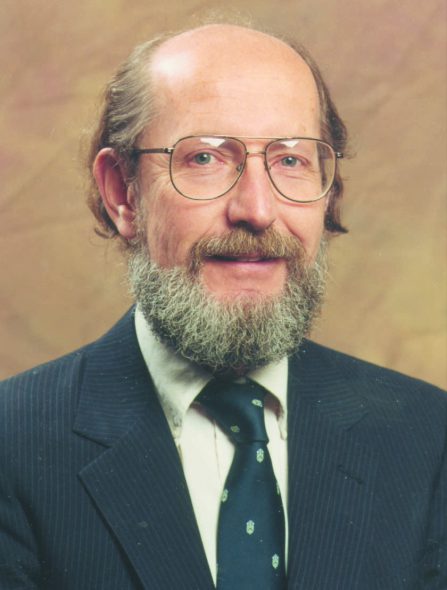
Milwaukee environmental attorney Dennis Grzezinski has been racking up wins against an entrenched state highway lobby.
There may not be an environmental attorney in the country with a stronger record of stopping highway projects than Dennis Grzezinski.
In his most recent win, representing the Milwaukee chapters of the NAACP and the Sierra Club, Grzezinski took Wisconsin DOT to federal court over a $1.1 billion urban highway widening project. With the case still pending, the state abandoned the project, citing budget pressures.
Over the last 12 years of his four-decade career, Grzezinski has been, as he puts it, “conspiring with other troublemakers” in public interest environmental law. And he has notched some big legal victories against the old-school Wisconsin DOT.
Grzezinski worked for 1000 Friends of Wisconsin to stop the $151 million widening of Highway 23 between Fond du Lac and Sheboygan. Earlier this year, a federal circuit court ruled that federal funds can’t be spent on the project. And while he didn’t stop the state’s $1.5 billion “Zoo Interchange” highway expansion, Grzezinksi helped win $13.5 million for transit to mitigate the project in 2014, in a case brought by Milwaukee Innercity Congregations Allied for Hope and the Black Health Coalition of Wisconsin.
I recently spoke to Grzezinski about what motivates this work, how legal action can be effective, and why coalition-building is so important. The interview has been lightly edited for clarity.
Why have you been involved with fighting so many highways?
In part because of disparities in transportation services or availability. There’s such a disparity in what’s available to those who are richer and whiter and who have cars, and those in our community who are less rich and less white and don’t have cars.
Meanwhile, the bus system, which is the only public transportation system we have here, has been starved for funds, and fares are almost as high as they are anywhere in the country. Thousands of jobs have migrated from the city of Milwaukee to the outlying counties and have generally been unreachable by any means other than private automobiles.
There were local organizations who stepped up to the plate and basically formed coalitions on a variety of issues. And transportation has come to the fore… Civil rights, health, environmental organizations have all joined together and cooperated. I’ve found clients and occasionally I’ve found folks who have been willing or able to pay. I have developed skills or experience and sometimes successfully opposed really misguided, unneeded, unaffordable, and, for various reasons, unlawful highway projects.
On the I-94 decision, how much of an impact do you think your suit had?
I don’t know. I’m not privy to the thinking within various officials’ heads. I am quite confident that the tendency of the litigation and the series of adverse decisions regarding the caliber and quality of decision-making on transportation projects in this state had to give defendants some pause. The litigation was also an integral part of the coalition-building regarding public advocacy around the project.
The request from WisDOT to the feds referred both to the fact that there wasn’t any money to advance the project any time soon and that there was going to be litigation.
I think we played a real part in the death for however many years. Wisconsin has made clear that they don’t see the state pursuing this project in the next five years. We had very serious claims that I think they didn’t have any way around.
What is the secret to success, would you say, in these cases?
It’s really, really important to be involved as early in the project as possible, following the initial notice that they’re looking at a project. It’s really important to weigh in with comments. I found it really important to develop coalitions of organizations — to get the whole range of interested community players involved, in attending public hearings and public minutes.
For decades, on environmental issues, environmental groups would show up and that was it. Over the last 10 or 15 years, we’ve managed to bring folks together with many different backgrounds and many different issues… and have them spend enough time together to realize that their goals are often very similar. That’s very helpful for political advocacy, for helping turn out more people to meetings, helping to get more and better press coverage.
We’ve been bringing socioeconomic issues into the [environmental review] process, submitting comments about the impacts on segregation and poverty and health on what look like straightforward transportation decisions. Transportation agencies in general are not very good at understanding the indirect impacts of their decisions.
Why are public comments so important, legally speaking?
They’ve got to address them. Generally [transportation agencies] don’t respond or address them very well. In some cases, they don’t even understand the issues. As a result, either because they don’t want to address them or they’re unable to, it leaves their environmental impact statements, it seems to me, up to very serious challenge.
In order to have standing to address the issue, it’s very helpful to have [comments from people] who are minority or low-income. It provides more credibility to those allegations.
When the overwhelming mass of our transportation dollars go to more and bigger and faster highways, and pennies are left for the downward spiral of transit, those become real issues.
Story by Angie Schmitt. A version of this story originally ran on Streetsblog. Angie Schmitt is a newspaper reporter-turned planner/advocate who manages the Streetsblog Network from glamorous Cleveland, Ohio. She also writes about urban issues particular to the industrial Midwest at Rustwire.com.
If you think stories like this are important, become a member of Urban Milwaukee and help support real, independent journalism. Plus you get some cool added benefits.
More about the I-94 East-West Expansion
- ‘Fix at Six’ Group Wants I-94 Expansion Delayed For Civil Rights Report - Jeramey Jannene - Mar 20th, 2024
- Coalition Admonishes I-94 expansion Record of Decision - Sierra Club - Mar 20th, 2024
- Feds Approve Interstate 94 Expansion - Jeramey Jannene - Mar 8th, 2024
- Advocates condemn approval of I-94 expansion - Sierra Club - Mar 8th, 2024
- I-94 East-West Project Receives Federal Approval - Wisconsin Department of Transportation - Mar 8th, 2024
- Federal Government Investigating Civil Rights Complaint About I-94 Expansion - Evan Casey - Jan 11th, 2024
- Op Ed: 8-Lane I-94 Expansion Is Worst for Carbon Emissions - Cassie Steiner, Cheryl Nenn and Terry Wiggins - Dec 18th, 2023
- Residents Concerned I-94 Widening Would Increase Flooding In Nearby Neighborhoods - Jonah Chester - Aug 10th, 2023
- Eyes on Milwaukee: I-94 Expansion Public Comment Deadline Extended - Jeramey Jannene - Jan 6th, 2023
- I-94 East-West study public comment period extended to January 31, 2023 - Wisconsin Department of Transportation - Jan 3rd, 2023
Read more about I-94 East-West Expansion here
Streetsblog
-
Car Culture Cements Suburban Politics
![Sprawl. Photo by David Shankbone (David Shankbone) [GFDL (http://www.gnu.org/copyleft/fdl.html) or CC-BY-SA-3.0 (http://creativecommons.org/licenses/by-sa/3.0/)], via Wikimedia Commons [ https://commons.wikimedia.org/wiki/File%3ASuburbia_by_David_Shankbone.jpg ]](https://urbanmilwaukee.com/wp-content/uploads/2017/10/1024px-Suburbia_by_David_Shankbone-185x122.jpg) Nov 23rd, 2018 by Angie Schmitt
Nov 23rd, 2018 by Angie Schmitt
-
Most Drivers Don’t Yield to Pedestrians
 Mar 22nd, 2018 by Angie Schmitt
Mar 22nd, 2018 by Angie Schmitt
-
Jobs Up Yet Driving Down in Seattle
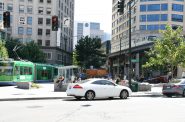 Feb 22nd, 2018 by Angie Schmitt
Feb 22nd, 2018 by Angie Schmitt
Transportation
-
Just How Bad Are Milwaukee’s Roads?
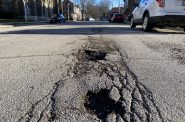 Apr 7th, 2024 by Graham Kilmer
Apr 7th, 2024 by Graham Kilmer
-
MPS Makes the Case for Referendum
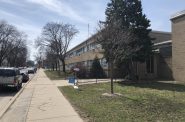 Mar 23rd, 2024 by Graham Kilmer
Mar 23rd, 2024 by Graham Kilmer
-
‘Fix at Six’ Group Wants I-94 Expansion Delayed For Civil Rights Report
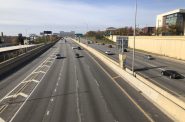 Mar 20th, 2024 by Jeramey Jannene
Mar 20th, 2024 by Jeramey Jannene

















Great to see Dennis contribution recognized.
It takes more than knowledge of law and skill of litigation, to be a formidable opponent to urban sprawl; leaving so many people behind. It requires a quality rare among those of us whom inhabit this planet – moral courage. Attorney Dennis Grzezinski is a hero for our time.
As with anyone speaking pro or con on government projects, Grzezinski seem to see things for one perspective only. I am not saying that’s bad but it important we keep that in mind when deciding which side of a project we ourselves are on.
His efforts to stop the inane idea of widening I-94 west of downtown were very much on target. The state DOT, with huge support from our elitist, narcissistic governor who does any and everything he can to hurt the City of Milwaukee, only works to enhance automobile and truck traffic. In my dictionary, “transportation” includes buses, light and heavy rail and air travel. We have thrown away an opportunity to have an $800,000,000 project, 90% paid by the federal government, that would have led to many jobs only because it was rail oriented.
I do have to say that the backers oi the project did a lot of harm to their cause by insisting it was a “High Speed Rail System between Milwaukee and Madison. It was project to connect Madison to Chicago with Milwaukee as an intermediate stop. High speed? Only in the minds of those who envisioned major rebuilding of the Chicago – Twin Cities route, But is was a good project that should have been moved on positively by the governor, not dumped in response to his ultra-conservative, money minded cronies that are doing their best keep lower income people from having any say in government.
That said, I am of the opinion that the Zoo interchange project should have been done, and in reality should have been done some years earlier.
I do applaud his efforts in getting that 13.5 million to mitigate the project.
Overall, he is a person that does do a lot for the average taxpayers.